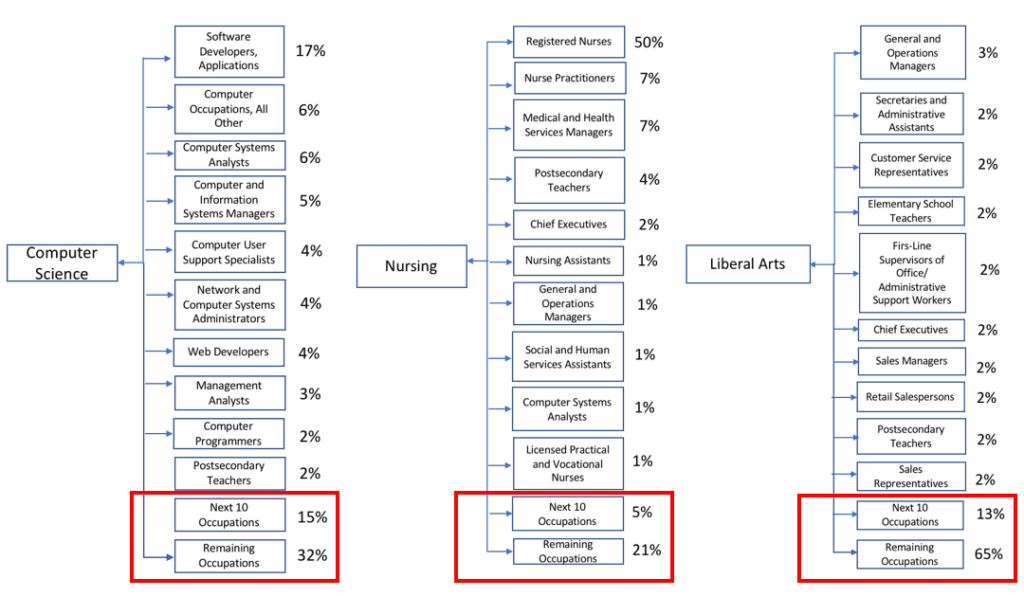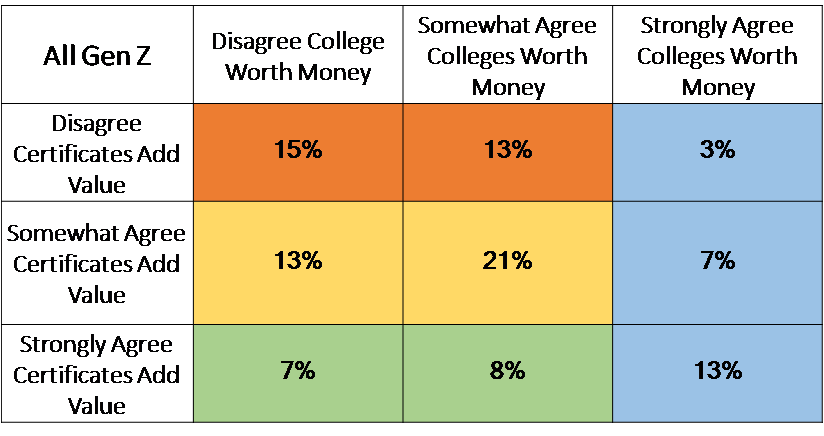Aligning the Liberal Arts Degree to STEM and Gen Z
While the economies of the U.S. and other nations are moving to greater automation and technological growth, the role of the liberal arts degree is getting lost in the shuffle or being disparaged as being out of alignment with workforce growth. The Science, Technology, Engineering and Mathematics (STEM) field is growing as a result of automation, artificial intelligence, big data, robotics, and autonomous vehicles. Advances in healthcare have led to a higher than average growth in the healthcare industry. Institutions offering liberal arts credentials have been slow to reinvent their degrees and other credentials or to better align them with in-demand occupations.
An analysis of labor and workforce information[1] shows that many degrees coming out of STEM disciplines result in a clearer pathway to employment. The figure below shows that more than one-half of those graduating with a computer science degree find themselves in a fairly predictable occupational grouping, such as a software developer or systems analyst. Those who earn a bachelor of science in nursing, to no surprise, find themselves as registered nurses, nurse practitioners or in other closely related healthcare professions. When looking at liberal arts degrees as a whole, we see intense fragmentation with 22% of graduates moving into 10 defined professions and another 13% in the next 10 professions.
Career Paths by Degree

So, the question is whether more value needs to be created for liberal arts degrees, or whether or not the degree needs greater alignment or adaptation? Analyzing the components of many liberal arts programs and the skills and competencies earned shows what appears to be many valuable skills for tomorrow’s workforce. In fact, with new economies rapidly growing and changing, one could argue that many of skills earned through a liberal arts degree are more valuable today than they were in the past. What will the workforce look like in 10 or 20 years? Will the skills learned today be applicable to the jobs of the future? According to a 2016 Morningstar Research study, teamwork, clear writing, problem-solving aptitude, and strong oral communication along with critical thinking are traits of a traditional liberal arts education. The interdisciplinary approach is valuable today as well as in years to come.
Liberal arts graduates may be better able to manage the complexities of working with a Generation Z or multigenerational and more diverse workforce. More demand for these graduates could also result from growth in a distributed or “work-from-home” workforce, as well as a global workforce.
As professional, continuing and online (PCO) education units and higher education in general, address a rapidly growing economy that is being fueled by big data, artificial intelligence and metrics, the skill to develop this new generation of workers may not be far behind. More progressive companies such as Google, Zillow, Salesforce or SAS may be more adaptive to change or acknowledge the need for a more employee-centered and low employee turnover environment. An analysis of many job postings[2] of these companies shows many skills and competencies that are developed through a liberal arts degree, such as communications, customer service, creativity, writing, presenting, and critical thinking among others, are more difficult to teach than how to read a financial spreadsheet.
For PCO units and their respective institutions, the question of creating more value remains. Should colleges and universities better promote their existing degrees to suggest more alignment to business and industry? Would the integration of more applied learning or internship experiences for the liberal arts student generate more value? Would the creation of alternative credentials (badges and certificates) for high demand skills, while one works toward a degree, elevate the value of the degree by highlighting specific skill sets?
Research shows that current Gen Z’ers, those with or without an undergraduate degree, will soon be a PCO’s new adult learner, as they are more likely to value alternative credentials. A 2017 UPCEA survey[3] shows that 23% of Gen Z’ers are very positive about college regardless of certificates. Another 15% who have mixed opinions about college strongly believe in certificates and another 34% somewhat agree they would add value. These findings suggest that Gen Z is open to alternative forms of education.

The survival or ‘thrive-al” of the liberal arts degree is dependent on many things, but potential to connect it to the needs of a shifting and fast-moving economy through the creation of alternative credentials that could be stackable, should be intriguing to what is forecasted to be a struggling higher education sector in the coming decade.
[1] EMSI 2018
[2] EMSI 2018, Indeed, LinkedIn and CareerBuilder websites
[3] UPCEA Survey of Generation Z and Young Millennials, 2017
Learn more about UPCEA's expert consultants.
Do you need help with your PCO unit or campus? We can help. Contact UPCEA Research and Consulting for a brief consult. Email [email protected] or call us at 202-659-3130.
Trusted by the nation's top colleges and universities, UPCEA Research and Consulting provides the best value in the industry today. UPCEA's industry experts have years of experience in Online and Professional Continuing education - put them to work for you!
UPCEA Research and Consulting offers a variety of custom research and consulting options through an outcomes-focused pricing model. Find the option(s) that best suit your institution.
Learn more about UPCEA Research & Consulting
The UPCEA Difference
Unmatched Experience: For more than 100 years, UPCEA consultants have exclusively served the needs of online and professional continuing education programs. UPCEA consultants leverage their extensive industry expertise to expedite solutions, anticipate upcoming shifts, and offer distinct best practices, effectively aiding clients in achieving their goals.
Cost Effectiveness: As a nonprofit, member-serving organization, we provide unmatched value, allowing you to maximize limited research and consulting budgets.
Action in Motion: Our cadre of experienced, skilled authorities and expert practitioners propels you forward, translating research and consulting into impactful implementation, a distinctive hallmark of UPCEA. Our team of current and former institutional leaders will support you, turning research and consulting into action.
Mission Alignment: Like you, our mission is to enhance and expand educational opportunities and outcomes for adult and other non-traditional learners. We share your values and work in partnership with you to advance access and excellence in education.
